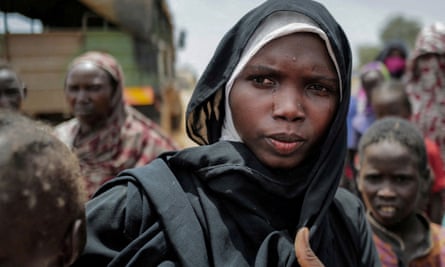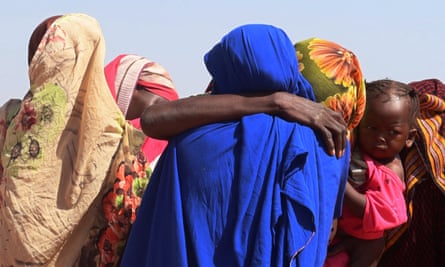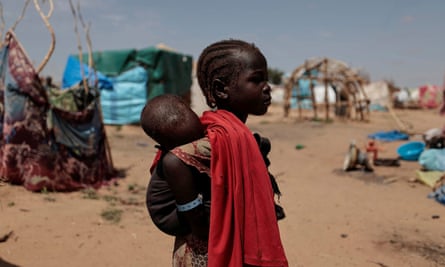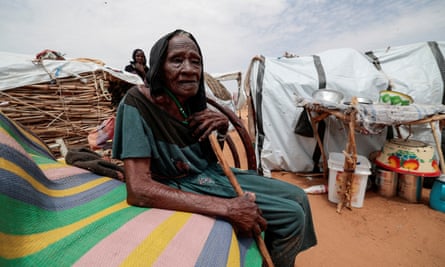Geneina, the capital of West Darfur state in Sudan, can feel like two cities in one. There are mass graves, abandoned armoured vehicles and homeless children, but also newly opened restaurants, bustling markets and factory-fresh Toyotas, nicknamed Kenjcanjia – meaning stolen in the local dialect – owing to their lack of registration plates.
As of last April, when conflict erupted between the military and the paramilitary Rapid Support Forces (RSF), two significant massacres have occurred in the city. The corpses were left unattended on the streets for up to 10 days, with dogs and chickens feeding on their decomposing flesh. Even to this day, remnants of the deceased corpses can be found on the streets, with people stepping over them as they carry out their daily routines.
Certain neighborhoods in the downtown area, previously occupied by individuals who had fled conflict in other parts of Darfur and sought refuge in government buildings, now appear deserted. Structures are scarred with burn marks and bullet damage from the clashes.
For a period of two months starting in mid-April and for one week in early November, Geneina was thrown into turmoil due to clashes that quickly took on tribal divisions. The Masalit and other non-Arab groups sided with the military, while the RSF and allied Arab militia were in opposition.
Over 10,000 individuals perished in the urban area, predominantly from the Masalit community, and countless others escaped to Chad across the western border.
In May, Arab militias aligned with the RSF surrounded the city. On June 15, the Masalit governor of West Darfur State, Khamis Abbakar, was reportedly tortured and killed by the RSF’s allies, causing thousands of people to flee to Chad. By June 22, the Darfur Bar Association confirmed that Geneina had been captured. In early November, there were additional conflicts that resulted in the last remaining soldiers of the army garrison escaping, signifying the final triumph of the RSF in the city.
During the months that followed, information started to surface about shocking atrocities carried out by the RSF and their partners in the town. On July 13th, a United Nations inquiry uncovered a large burial site containing the remains of numerous Masalit civilians near Geneina, who were reportedly all murdered by the RSF between June 13th and 21st.

Several Masalit individuals chose to go towards the perceived security of the military garrison near Ardamata instead of Chad. On June 13, while traveling to Ardamata, they reported being fired at. Fatima, who preferred not to disclose her surname, said, “Arabs suddenly emerged and began shooting at us.” She added, “People were forced to jump into the river with their children [to avoid the bullets].” Fatima also shared that her son suffered the loss of his arm as a result of the shooting.
Abakar Haroun, a participant in a team assigned to bury the deceased, reported that completing the task required multiple days. “I recall one day in particular, where I worked from 8am to 6pm hand in hand with my colleagues, burying individuals in the al-Shati neighborhood cemetery,” he shared.
“I observed a total of 117 deceased individuals outside of my residence,” disclosed Samia Osman (pseudonym). “We had to physically navigate over the bodies in order to enter our houses.”

Numerous Arab civilians lost their lives during the conflict, primarily due to shelling by military tanks which remain abandoned in Arab areas. An employee at the Sudanese Red Crescent, who is not an Arab, mentioned that the exact number of fatalities is uncertain, as Arab communities have their own method of handling the deceased. Emir Massar Aseel, a traditional Arab leader who has been accused of committing atrocities against the Masalit people, alleged that the death toll could be in the thousands.
On November 5th, during the army’s retreat from the Geneina region, a massacre occurred in Ardamata resulting in the deaths of hundreds of Masalit individuals. According to witnesses, members of the RSF and allied militia systematically targeted Masalit individuals by searching houses.
According to an anonymous source, a leader from the Masalit community in Ardamata named Jamal Badawi reported a death toll of 236 people in his region. Another individual who assisted with the burials described the scene as bodies stacked on top of each other, resembling animal hides.
The RSF has gained control over West Darfur state, resulting in a government closely aligned with them. The recently appointed governor, El Tijani Karshoum, is attempting to calm tensions within the population. He has urged those who had fled across the border to Chad to return, promising reliable utilities such as electricity and water, commonly unavailable in areas under military control. To maintain order, a curfew is in place from 7pm to 7am every night.
The city has returned to a state of uneasy tranquility, despite the recent traumatic events. Weekends now see a resumption of weddings and construction of houses is taking place in Arab communities.

Display the image in full screen mode.
The presence of homeless children, however, serves as a reminder of the recent past. A former employee of the child protection unit of the United Nations’ peacekeeping mission in Darfur said most were either orphans who lost their parents last year or the children of families who fled across to Chad but who returned without their parents due to the “terrible” conditions in Chad’s refugee camps.
The UN human rights office reported on Friday that both parties involved in the civil war in Sudan have committed acts that could be classified as war crimes. These include indiscriminate attacks on locations where civilians gather, such as hospitals, markets, and displacement camps.
The United States has officially declared that the conflicting factions have committed acts of war crimes and acknowledged the involvement of the RSF and their allied militias in carrying out ethnic cleansing in West Darfur. Both sides have expressed their intent to examine reports of killings and mistreatment and hold accountable any combatants found responsible.

Currently, the main danger in Geneina is from above. In order to combat the progress of the RSF, the military has initiated airstrikes on RSF-held areas, causing more civilians to flee.
Leni Christiane from the World Food Programme stated that the RSF-controlled areas were being denied humanitarian access at the same time. She emphasized that the current situation in Sudan is extremely dire, with millions of people suffering from the effects of conflict and struggling to provide food for their families. There have already been reports of individuals dying from hunger, but difficulties with access make it difficult to reach those most in need of urgent aid.
Source: theguardian.com


















